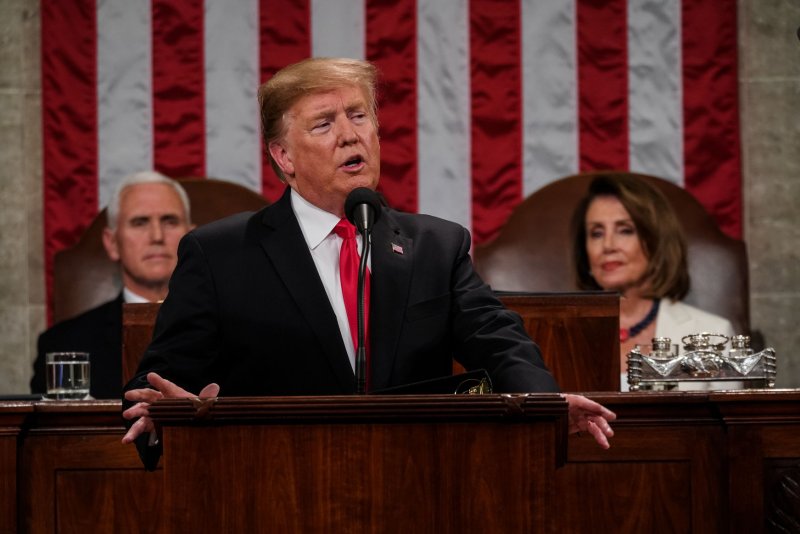We see no strategy behind President Donald Trump's State of the Union speech, only a glimpse of a fragmented policy. Photo by Doug Mills/UPI |
License Photo
Feb. 6 (UPI) -- U.S. President Donald Trump's State of the Union address was nothing less than sensational, a great show worthy of a great showman. The show included several people/attractions who added an emotional spin to the presidential speech. People like the officer who was badly wounded in the attack on the synagogue in Pittsburgh or the father of a fallen solider who perished in the attack on the USS Cole 18 years ago were present. Every now and then, Trump would call on one of them, salute to him or her and receive a huge round of applause.
However, the speech laid no strategy for the year to come, especially regarding the Middle East. He started his talk on the Middle East by saying that he adheres to realism and rejects "discredited theories" that achieved no progress in the past. From this perspective, he said, he moved the U.S. Embassy to Jerusalem. However, Trump did not explain how this move will achieve any progress. What is next? What is the strategy behind this move? Will it galvanize the stalling peace talks? Will it ensure a viable Palestinian state that can co-exist peacefully next to the Israeli state? Nothing of this sort was revealed.
He said that before he assumed the presidency, the Islamic State had control of over 20,000 square miles in Syria and Iraq. He claimed that IS is defeated and that U.S. allies will exterminate its remnants. However, Trump should have known better from the Iraq episode how the early disengagement allowed terrorist groups to re-emerge in a more virulent manner. His statement totally contradicts the account of his generals who realize that IS can regroup and reorganize.
He also said, "Great nations do not fight endless wars." The problem with war is that a country can decide when to start it, but does not necessarily have control of when to end it. Ending a war haphazardly, when certain conditions are not met, will only result in more chaos. So far, we have seen increased chaos in Syria because of the unplanned American withdrawal. The president also did not mention Syrian President Bashar al-Assad, despite the fact that he is today the platform for Iranian expansionism that is fueling the instability in the region.
On Afghanistan, he pledged to give peace a chance and to engage with various Afghani groups, including the Taliban. However, Trump, being a tough negotiator, should have known better that negotiations should be conducted from a position of strength and not of weakness. The unconditional accelerated withdrawal of American troops from Afghanistan is likely to be perceived as a sign of weakness by the United States' most vehement enemies in the country.
Trump then moved to Iran, accused the country of doing very "bad bad" things. He also promised that he will never allow Iran to acquire nuclear weapons. This is why, he said, he withdrew the United States from what he described as a "disastrous" nuclear treaty. He did not say how he can ensure that Iran will not acquire nuclear weapons now that the United States can no longer inspect its nuclear sites. Was he signaling a possible pre-emptive strike on Iran's nuclear facilities? Again, on this very important issue, the speech was ambiguous.
He referred to sanctions. Nevertheless, sanctions in the past did not deter Iran from pursuing its nuclear program. The nuclear program is developed domestically in Iran and does not rely on any expertise or input from the West. Therefore, there is no clear policy on Iran except for increased sanctions. No policy was spelled out to counter the proliferation of its non-state actors in the region. Nothing. Though the imminent threat from Iran comes from those militias fomenting chaos more than from a hypothetical nuclear strike that will be fatal to everyone, including Iran.
In a nutshell, we see no strategy behind the president's speech, but only a glimpse of a fragmented policy. American troops are withdrawing from conflict zones without any concrete agreements with allies. On the contrary, we see allies acting on their own, now that they can no longer rely on American support. Most importantly, there is no coherent and complete team in Washington to devise a comprehensive plan for the region. The very critical position of assistant secretary of state for near eastern affairs remains vacant. The nominated candidate has not been confirmed by the Senate due to bitter and petty partisan bickering.
So for the coming year, we do not expect an action plan driven by an overarching strategy but more of a set of actions and reactions so that the show can go on.
Dania Koleilat Khatib is an affiliated scholar at the Issam Fares Institute for Public Policy and International Affairs at the American University of Beirut. She specializes in U.S.-Arab relations and researches sectarianism, extremism and governance. Her book "The Arab Lobby and the U.S.: Factors for Success and Failure" was published by Routledge UK and translated to Arabic.















